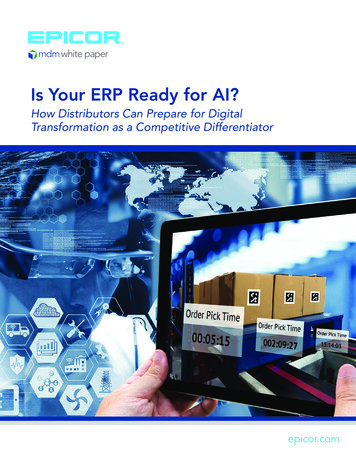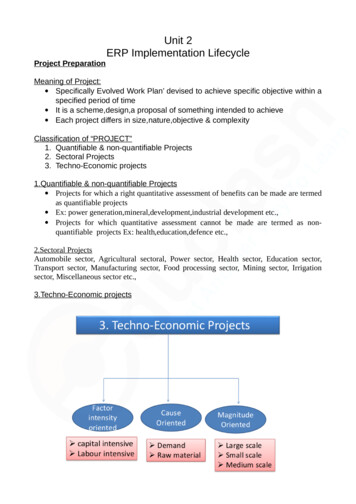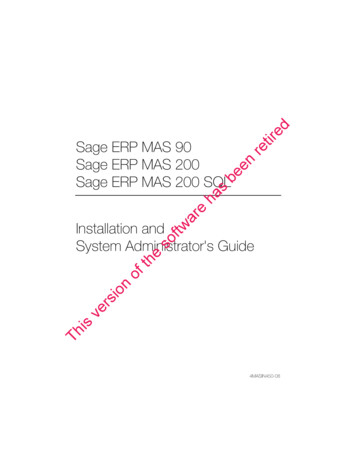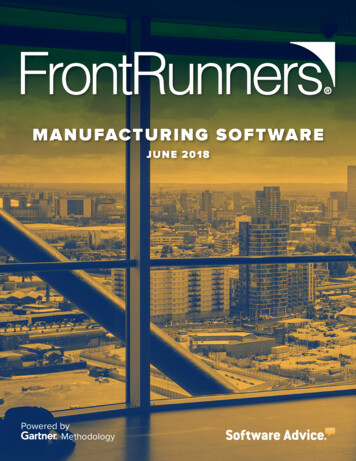
Transcription
mdm white paperIs Your ERP Ready for AI?How Distributors Can Prepare for DigitalTransformation as a Competitive Differentiatorepicor.com
Is Your ERP Ready for AI?The Artificial Intelligence ImperativeArtificial Intelligence (AI) is no longer science fiction – it’s the here and now. And it’s not only becomingmore integral to how we do business every day, it’s also the way in which businesses will make theirdigital transformation journeys a competitive differentiator. Companies that wish to grow and becomemore profitable run a very real risk of being left behind if they don’t embrace it.AI is also transforming how business leaders look at enterpriseresource planning (ERP) functionality, driven by digital disruptorsthat are leveraging AI across several dimensions to innovateon behalf of customers. But what is it? And how exactly can ithelp a business grow? This white paper outlines how artificialintelligence will increasingly support and enhance core ERPcapabilities for distributors.The AI revolution is goingto be at least as big as theInternet revolution.Ian Heller,Modern Distribution ManagementFor the vast majority of businesses, there are foundational steps needed to prepare for this AI-drivendigital transformation. A strong and adaptive technology platform that can integrate increasinglypowerful AI functionality is a relatively new, but critical, requirement.Management teams not only have to plan how to fully leverage AI capabilities to best serve theirparticular products and target markets, but in most cases, also need to build a strategy that includeschanging the internal culture and mindset towards technology in order to survive and thrive in thefuture.What is Artificial Intelligence?Artificial intelligence has manyArtificial intelligence is a concept that refers todefinitions and layers within thosea computer’s ability to perform tasks and makedefinitions. At its core, however, itrefers to a computer’s ability to performdecisions that would historically require some leveltasks and make decisions that wouldof human intelligence.historically require some level ofEpicor.comhuman intelligence. Some define AI asthe ability for a computer or machine to take inputs from its environment and act in ways similar tohumans, but it’s this notion of taking inputs, making decisions and acting on them that really forms thecore of AI.Broadly speaking, there are four types of AI*, each of them with solid business applications, some ofwhich we already encounter every day in some form:Internet AIOn more sophisticated websites, the lists of recommended items you see when you shop are basedon information about your previous purchases and preferences. The more you use the site, themore accurately the Internet AI anticipates your needs and wants. The result is that the more datayou provide over time about your interests and time spent on specific products or topics, the morepersonalized the user experience becomes.*Source: Dr. Michael Wu, Chief AI Strategist, PROSmdm white paper2
Is Your ERP Ready for AI?Perceptual AIThis type of AI is used in technologies that respond to some sort of input, such as speech or images. Ifyou use a speech assistant like Alexa to schedule an appointment or even play a certain song or radiostation, that’s perceptual AI. As part of its mobile app, Amazon now offers image-recognition softwarethat recognizes a part or item and brings up the matching product to enable quick ordering.Autonomous AIAs the name suggests, this refers to machines that are independently performing actions that used torequire human beings, such as self-driving cars or robots that assemble cars or fulfill warehouse orders.By at least one industry estimate, there are now more than 100,000 warehouse robots in service.Business AIThis kind of AI is used to automate certain business decisions and processes and is already familiarto many distributors. Business AI includes such functions as pricing recommendations, automaticinventory replenishment, fraud detection, or algorithmic stock trading.Internet AIPerceptual AIAutonomous AIBusiness AIRecommendationEngineVoice OrderingWarehouse RobotsDemand ForecastingImage RecognitionDelivery DronesFraud DetectionPersonalizationPricing Decisions*Source: Dr. Michael Wu, Chief AI Strategist, PROSDespite their differences, all of these types of AI are driven by the same thing: Big Data. And they’renot only changing the face of business, they’re fundamentally changing what we as customers expectin both our personal and business lives.Data, however, is only useful if it can become actionable business intelligence. Without structure andcontext, its only effect will be to overwhelm your business and your sales team. A salesperson with tenmillion lines of invoice orders has an abundance of data, but not much in the way of useful information.mdm white paper3
Is Your ERP Ready for AI?Machine, Meet Machine: The Internet of ThingsAnother application of artificial intelligence that is advancing rapidly is augmented reality and theInternet of Things (IoT). Increasingly sophisticated sensors are monitoring wear and failure rates andproviding analytics to suppliers for automated replenishment and proactive maintenance programs.While the vision of “lights-out replenishment” has been around since the early days of the Internet, theexpansion of AI-driven replenishment is still in its early stages.The same is true for the use of augmented reality, where a tablet or even goggles with a headsup display visually guides a technician through step-by-step repair and safety instructions. Theseapplications of artificial intelligence rely on enormous amounts of complex product data and content– specifications, 3D imagery, and logic paths for repair steps. That requires a core technology platformthat can support not only current requirements, but what will surely be the much more sophisticatedand demanding technology capabilities of the future.ERP’s Role in Digital TransformationAn enterprise resource planning (ERP) system that can manage exponentially growing quantities ofdata and turn it from an undifferentiated mass into actionable business information is essential to growyour business. Here are some of the things that an ERP can do with raw data:JJSupply visibility into business operationsJJUtilize pricing software to optimize profitabilityJJProvide access to global supply chainsJJJJJJJJJJJJJJIdentify challenges, uncover opportunities, helpyou make faster decisionsAutomate and streamline time-consuming tasksand redundant processesGive employees tools to be successful andproductiveProvide real-time information to any member ofyour team, anywhereIncrease productivity and collaborationManage working capital like inventory toimprove your cash conversion cycleProvide forecasting tools that allow you to makeinformed decisionsmdm white paper4
Is Your ERP Ready for AI?What Should I Look for in an ERP?Beyond the core functions above, there are three key words tobear in mind when evaluating an Enterprise Resource Planningsystem that can position your company to stay in front ofdigital transformation:JJJJJJEverything we do at Epicor isbuilt around three ideas:fit, ease and growth.Tony CorleySenior Product Marketing Manager, EpicorFit: Is the system tailored to your specific market space or is it one-size-fits-all?Ease: Is it able to turn huge amounts of data into an easy-to-use interface that allows users toquickly access customer information? Is it easy to set up? Easy to learn?Growth: Do the tools empower your back office, warehouse and frontline sales teams to betterserve customers in whatever ways they want to be served? Do they help you improve sales,grow margins, reduce costs? Are they scalable and adaptive to support your growth?How Can an ERP System Grow my Business?Let’s take a look at some of the ways an ERP can help put you ahead of your competition.A good ERP makes it easy to manage all of your customers. A salesperson reviewing a territory canhave instant access to information on each client. How many days has it been since the salespersonlast contacted them? When did the client last place an order? Have they slowed down their rate ofpurchasing or stopped buying a particular type of product? Have their buying habits changed? It couldbe that a rival team has moved in and is trying to beat you on price. A good ERP will use somethingcalled a “customer buying trend analysis” that lets the salesperson see all of this information in oneplace.A good ERP makes it easy to meet customers where they are. Businesses connect with theircustomers in multiple ways: account managers, counter sales, call centers, inside sales, e-commercesales and third-party marketplaces. A good ERP will meet customers at their preferred point of saleand be able to track and integrate information about products, pricing, inventory, customers, invoices,and payments from multiple systems.A good ERP can integrate data from multiple sources. Ratherthan having to scrap any existing data you have housed onanything from MS Excel to a database management systemor a customer relationship management (CRM) system such asSalesforce, a good ERP will let you seamlessly import it all intoyour ERP and begin analyzing and using it right away.A good ERP can help you to optimize pricing. Strategic pricingtools analyze client invoice data, product baskets, and orderpatterns to help you determine the ideal price. Are theresmaller customers who are getting prices that aren’t justifiedby the amount of product they buy? Are there some customerswho are more price-sensitive than others? Are there productgroups that have more margin opportunity because they haveless price elasticity of demand?mdm white paper5
Is Your ERP Ready for AI?What’s Next?Amazon gets the lion’s share of attention as the primary disruptor across many industries throughits innovation and development of artificial intelligence on behalf of the customer. But there areincreasing numbers of emerging disruptors – in both new and traditional business models – that areaccelerating how AI is being deployed to gain competitive advantage across all customer segmentsand product verticals.Smart planning has always been a part of any successful business; that’s never been more the casethan now, in a marketplace that disruptors are fundamentally transforming with tools that have a levelof power and sophistication undreamt of even a few years ago. The challenge for most companies isto find the time and internal talent to create a strategy, build a roadmap that includes selecting anddeploying the right technologies and execute a plan to disrupt rather than be disrupted. It’s not toolate to catch the wave, but the time to act is now.This white paper is based on a July 31, 2018 webcast co-presented by Epicor and Modern Distribution Management(mdm.com), “How Artificial Intelligence Disrupts Distribution: What you Must Know.” The webcast was hosted byIan Heller, MDM President & COO, and Tony Corley, Epicor Senior Product Marketing Manager.mdm white paper6
About EpicorEpicor Software Corporation drives business growth. We provide flexible,industry-specific software that is designed around the needs of ourmanufacturing, distribution, retail, and service industry customers. More than40 years of experience with our customers’ unique business processes andoperational requirements is built into every solution—in the cloud, hosted, oron premises. With a deep understanding of your industry, Epicor solutions spurgrowth while managing complexity. The result is powerful solutions that freeyour resources so you can grow your business. For more information, connectwith Epicor or visit www.epicor.com.Contact us for more information on Epicor Products and Services .com
mdm white paperMDM’s Award-Winning Products & Servicesfor the Wholesale Distribution IndustryModern Distribution Management (www.mdm.com) has been the mosttrusted resource for market intelligence, analytics and industry insight forwholesale distribution executives since 1967. As a market research andmedia company, it has developed the industry’s premier thought-leadershipcommunity. It covers trends, management best practices, technology andinnovation through its research reports, media channels, conferences andmarket analytics services and products.2569 Park Lane, Suite 200Lafayette, CO 80026, USAPhone (303) 443-5060Toll free (888) 742-5060mdm.comCopyright 2018 MDM. All rights reserved.This document is protected by U.S. and international copyright and intellectual property laws.
This white paper is based on a July 31, 2018 webcast co-presented by Epicor and Modern Distribution Management (mdm.com), "How Artificial Intelligence Disrupts Distribution: What you Must Know." The webcast was hosted by Ian Heller, MDM President & COO, and Tony Corley, Epicor Senior Product Marketing Manager.











